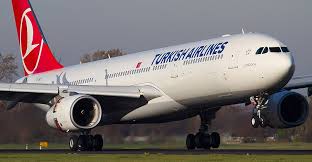
TURKISH AIRLINES MAKES AN EMERGENCY LANDING IN NEW YORK WHEN THE CAPTAIN DIES MID-FLIGHT.
Captain Ilcehin Pehlivan, 59, of Turkish Airlines, died unexpectedly after becoming ill on a flight from Seattle, USA, to Istanbul, Turkey.
According to an airline spokesman on social networking site X, the event occurred in the air and resulted in an emergency landing in New York.
On Wednesday, the BBC reported that the flight, TK204, took off from Seattle shortly after 19:00 Pacific Time on Tuesday. Captain Pehlivan reportedly became unwell over the Canadian region of Nunavut, prompting the co-pilot and second pilot to take over control of the aircraft.
Yahya Ustun, a representative for Turkish Airlines, stated that the plane’s captain died after an emergency landing after receiving failed first assistance.
The Airbus A350 made an emergency landing at John F. Kennedy Airport in New York around eight hours after departing from Seattle. Arrangements were then made to fly the people on to Turkey.
Captain Pehlivan had been with Turkish Airlines since 2007 and had just passed a normal health check in March, which revealed no difficulties that would jeopardise his ability to fulfil his duties, according to the carrier. The cause of his death has not yet been revealed.
The Turkish Air Traffic Controllers’ Association (TATCA) paid tribute to Captain Pehlivan, stating that he had “served the aviation community for many years” and expressed condolences to his family, friends, and colleagues.
Pilots are subject to regular medical inspections, and those over the age of 40 must renew their medical certificates every six months to guarantee they are fit for duty.
This situation is similar to one that occurred in 2015 when a 57-year-old American Airlines pilot died mid-flight from Phoenix to Boston, prompting the first officer to make an emergency landing in Syracuse.
Currently, aviation regulations require two pilots to be in the cockpit of big commercial aircraft at all times.
However, technology breakthroughs are being developed in Europe to allow for single-pilot operations during specific parts of a flight, such as a cruise.
This would allow other cockpit crew members to relax, but safety precautions would need to be in place in case a pilot became disabled.
According to the BBC, the European Cockpit Association and other pilot groups are concerned that lowering cockpit staff could jeopardise the safety of passengers and crew on board.
![]()
